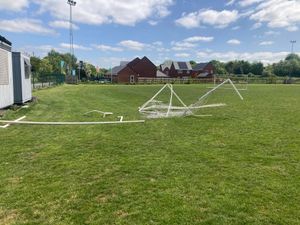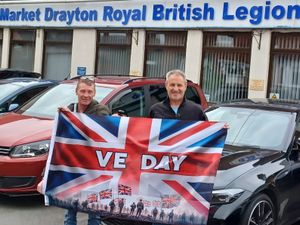U-boats, torpedoes and a sympathetic German: Veteran Bill, 99, relives day of submarine attack
William 'Bill' Judd of Market Drayton has seen more of the world than most.
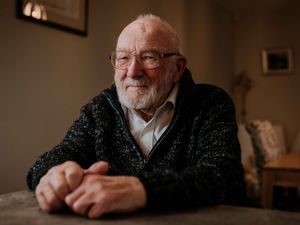
Born in Cardiff in 1920, Bill married Margaret Turley in 1941 when he was working in a steelworks. Then, in 1943, he was called up to the Navy.
His role as a gunner for the Defensively Equipped Merchant Ships (DEMS) division meant escorting convoys of merchant ships and protecting them from German attacks.
He would go on to see most of the world's oceans and dozens of countries from his gunner seat over the course of the war, and finished his service with a six-month stint in a kitchen preparing potatoes.
Approaching his 100th birthday, he has reflected on an incredible career in the Navy that included surviving his ship being sunk by a German submarine.
He was always a small man but has shrunk in his old age, while the shock of red hair he had in his youth has long gone white. And his head bears the marks of the skin cancer he suffered from the months he spent in a blazing hot Mauritian camp with no hat.
But he is still as sharp as a tack, with a wicked sense of humour. He recounts his time on the seas with clarity and several laughs.
Torpedo attack
Bill's first assignment, on the SS Clan MacArthur, would turn out to be his most eventful.
"I got married in '41 in February. We had a little girl, Ann, she was born on December 3, 1942 and I was called up in February '43. I was called up and that was it.
"I went to Pwllheli, that's where the training station was. I was there for three months training as a gunner and an able seaman.
"From there I went to Glasgow and picked up my first ship. She was called the Clan MacArthur. I was only there for about two weeks and we went to sea.
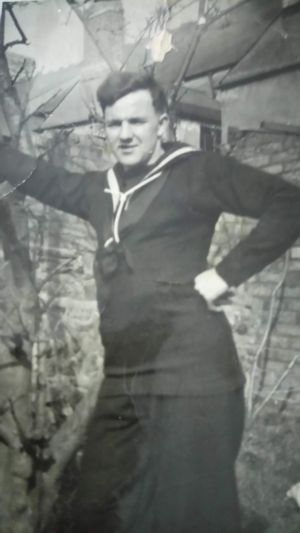
"We were taking mail and locomotives to Cape Town. We missed the place we were supposed to go, and ended up in Durban where we unloaded the locomotives.
"We left Durban for Mauritius and we left in a convoy of four ships with an escort of a 'whale killer' ship, which is just like a tugboat with a gun on it.
"Two days out the convoy split up. Late in the first afternoon one of my mates, he reported seeing a periscope and straight away the captain changed course again, and off we really went at full speed.
"It was to no avail."
Despite the captain's zigzagging, the ship was hit by three torpedoes from a German submarine early in the morning of August 12.
Bill was woken up by orders to get to the lifeboats. 53 men died as the ship sank, one of them a DEMS gunner like Bill.
"We got in the three lifeboats and the submarine came up alongside the boat I was in. He said he was sorry for sinking the ship but he said 'it's my job'. He was a very nice chap really.
"He offered medication for any cuts and bruises but that's all he could do. I've since learned his name was Wolfgang Lüth."
Rescued
Bill and the other 29 men in his lifeboat were stranded for more than a day before being rescued by a French boat.
"It was very cold even though it was the Indian ocean – it was hot in the day and freezing cold at night.
"The first mate took charge of our boat and he started rations straight away because the ocean is a hell of a big place!
"We saw that day out and we settled down for the night. The following morning we got up, everyone that could stand up, and looked around, but we couldn't see anything."
The following day the men were rescued by a French boat.
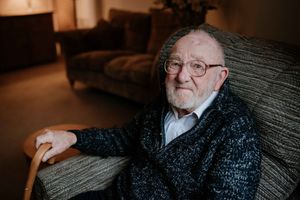
They were taken to their original destination, Mauritius, where Bill arrived with nothing but a set of pyjamas and an oilskin mac.
He said: "The local people, they dressed me with boys' clothes because I was about the smallest man on the ship.
"I was there for four and a half months without a hat and I got skin cancer in my head.
"We didn't have anybody to pick us up."
Christmas in Kenya
Eventually another ship arrived and took the sailors to a naval transit camp near Mombasa, in Kenya.
"There were loads of tents there, they took two men each. It was in a coconut plantation under coconut trees. It was in walking distance of Mombasa itself.
"I spent Christmas Day 1943 in Mombasa and even though the temperature was up in the 40s we had roast beef, turkey, pork, everything. It was marvellously cooked and it was all cooked in 45-gallon drums.
"The grub was out of this world and that was the only place in my life that I had a Christmas pudding."
After 28 days in that camp, Bill was re-assigned to a supply tanker named the Gold Ranger.
The ship would sail out of port at night and meet destroyers and mine-layers to refuel them.
He did return to Britain but in sad circumstances - his father was ill and unlikely to survive.
He was granted compassionate leave and made the long journey back from Africa via the Suez Canal, Italy and Gibraltar.
Bill arrived in Liverpool on June 4, 1944 – just two days before the D-Day landings.
He was told that all British leave had been cancelled, but he decided he wanted to see his wife and young daughter.
He wrote a letter to the admiralty, explaining his situation and his experience on the Clan MacArthur, and it worked – he was granted six days with his family.
"We made the most of the time we had together," Bill said. "It was wonderful. She came back to Liverpool with me because she had a great-uncle there."
But soon it was time for Bill to return to service, and he left Liverpool on the Esperance Bay.
It was on that ship that he spent most of the rest of the war, transporting troops and prisoners. He visited Australia, New Zealand and much of the Mediterranean.
"When we were on the ships we were always in convoy so we did see ships blowing up and things like that but we were very lucky actually. Carrying troops, we were always very well-escorted."
He was in Australia in 1946 when he got his 'demob notice' – the war was over.
"I didn't join the Navy until '43 so I wasn't sent home straight away. I had to wait my time before my number came up and I was in Australia six months."
He worked in a 'cookhouse' preparing vegetables and potatoes.
"We had a nice group, there was eight of us working in that kitchen. A good job."
Back to the steelworks
When he got back to Cardiff via Devonport, Bill returned to work at the steelworks.
He and Margaret had another daughter, Sue, and he would carry on working various jobs until he retired in 1982, from a job as a lost property officer in a police station.
Margaret had an arthritic spine and Bill cared for her for many years, before her death in 2007. The two had been together 70 years in all.
Bill carried on living in his hometown until three years ago, when he came to Shropshire to stay with Sue in her Market Drayton home.
The pair visit the town's Royal British Legion club in Church Street every Sunday for a pint and a catch-up with fellow veterans.
Bill said he finds Shropshire "marvellous" and since moving here has enjoyed trips to Shrewsbury, Powys Castle and Chirk Castle.
He has an electric scooter that allows him to get out and about, including to the town's war memorial earlier this month.
Sue believes he was one of the oldest veterans who attended the town's Remembrance Sunday service.
He has even discovered another Judd on the memorial.
He said: "I had a cousin who in the early days was in the Shropshire Light Infantry. I'm sure he started the Judds up here."
In total Bill has two daughters, four grandchildren, nine great-grandchildren and four great-great-grandchildren.
The family is preparing for his 100th birthday in March, but Sue gave a wry smile and didn't give much away when asked if there are any plans.
"I'm sure we'll be doing something," she said. You can't let a birthday like that go by without celebrating."


